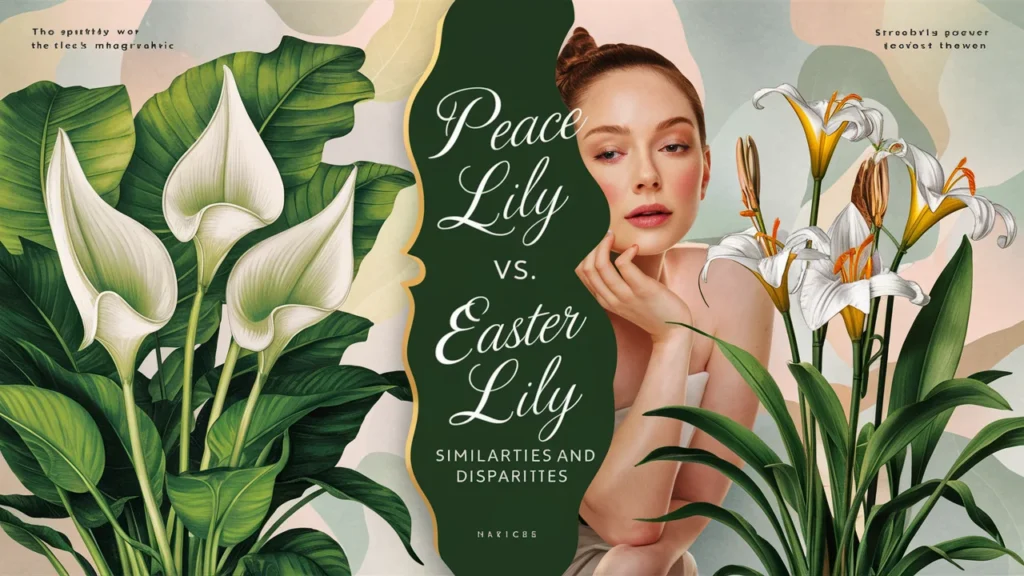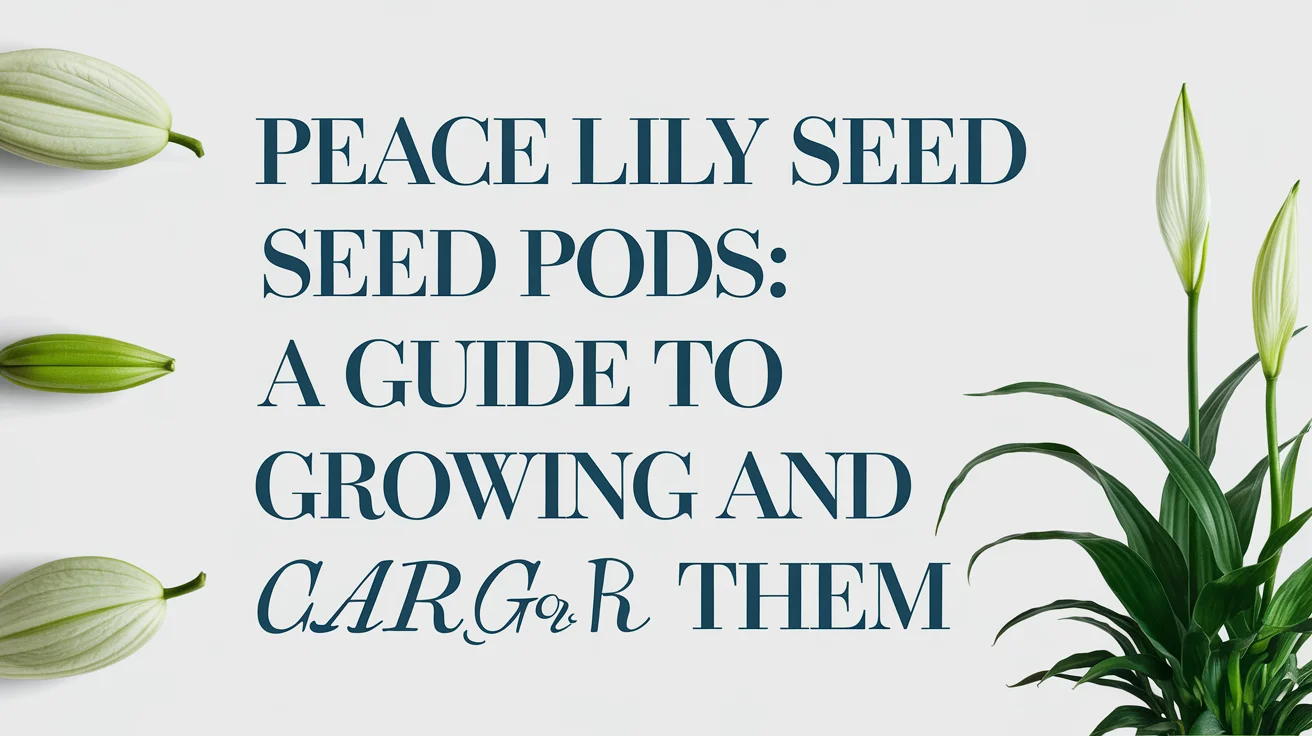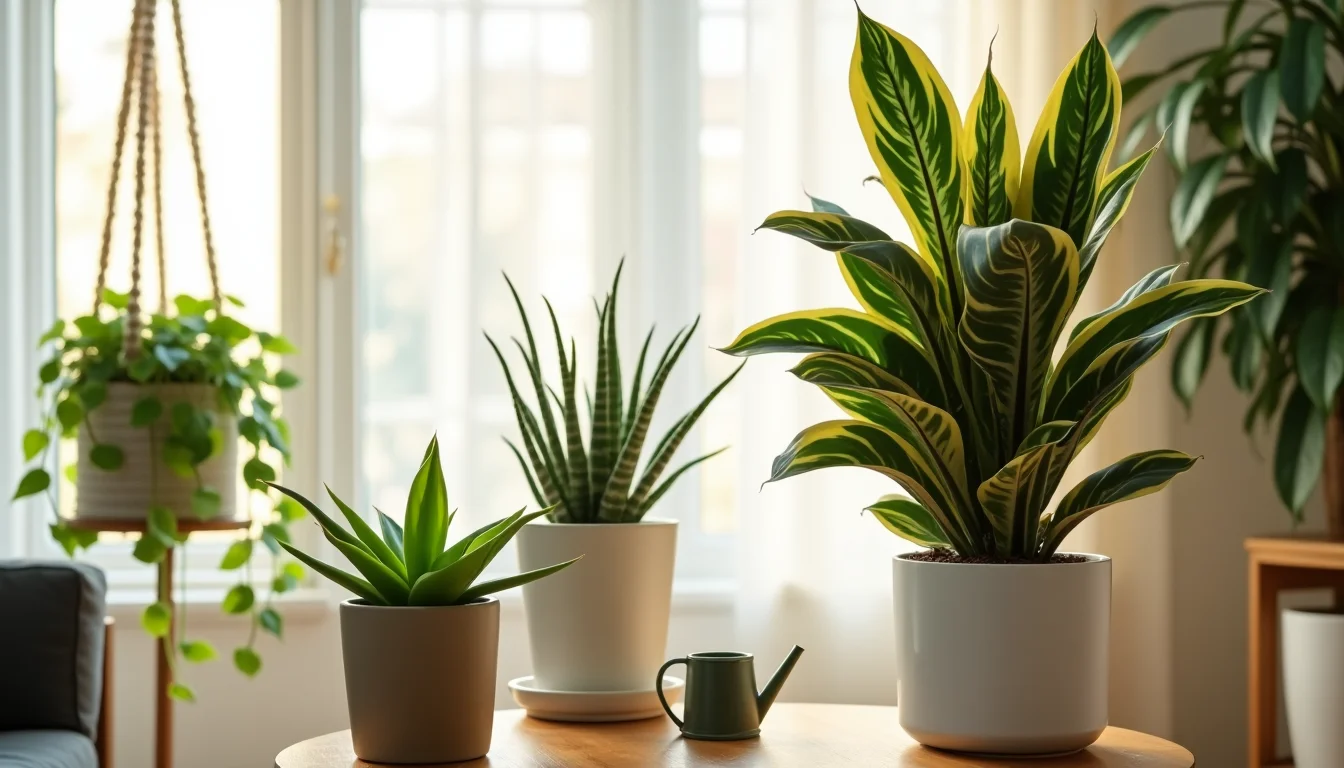Within the category of lilies, both peace lily and Easter lily are unique in their beauty and elegance. Although in their many aspects, especially their appearance, care, symbolism, and even genetics, these two plant species often vary across a wide scale. If you are a plant lover or an individual wanting to incorporate some plants into your household, knowing a peace lily vs Easter lily can guide you on which plant will suit your space effectively, so that you can avoid getting confused as to which is which.
Peace Lily – Definition 🌿
The peace lily (Spathiphyllum) has a beautiful culture of growing like any other well-known houseplant with beautiful green leaves and white flowers. The peace lily, as its name asserts, is not a true lily. It is a member of the family Araceae and has relatives among philodendrons, anthuriums, and the like.
Key Features of Peace Lilies:
- Outline: When it comes to the part of the plant that goes above the surface of the soil, peace lilies have fleshy, dark green tuberous foliage along with white blooms called spathes which, although they appear as flowers, are modified leaves.
- Light Requirements: Adequate light is the key factor when growing this plant, as it is very tolerant of low to medium indirect light; therefore, it is also suitable for indoors.
- Watering Needs: The peace lily prefers the soil to remain uniformly moist, although waterlogging should be avoided at all costs. It is quite a forgiving plant, showing signs of wilting when it requires watering, which enhances its ease of management.
- Toxicity: Sad to note, though, when it comes to peace lilies, they are dangerous to pets and people alike. When eaten, parts of the plant may cause irritation, vomiting, and other issues due to calcium oxalate crystals present.
What is an Easter lily? 🌸
Easter lilies (called Lilium longiflorum) are true lily plants and are popular for their large white trumpet flowers that protrude. This plant is usually linked with Easter as it represents the intertwined themes of newness in clean frees in the Christian faith.
Key Features of Easter Lilies:
- Easter lilies are usually longer than peace lilies. The latter has clusters of large, trumpet-shaped, fragrant flowers. The leaves are dark in color as well but are long and slender.
- Light Requirements: They grow outdoors but can also be raised in a greenhouse as they enjoy bright, indirect sunlight.
- Watering Needs: As opposed to the peace lily, the Easter lily should be potted in well-draining potting mix, and watering should be done sparingly but deeply. Root rot is an overwatering-related problem.
- Toxicity: Easter lilies are dangerous to kittens as they can harm their kidneys after ingesting even a little bit. Due to this factor, they are not favorable plants in a household with cats.

Peace Lily vs. Easter Lily: Appearance 🌱🌷
Anyway, one of the most noticeable features of peace lily vs. Easter lily is their look. Most peace lilies feature smooth, oval leaves with a twisty, shiny texture. The blooms (spathes) that are white in color and the flowers that are produced by an Easter lily are of a different size.
Easter lilies, on the other hand, are taller and more imposing, especially in height, which can be as much as 3 feet. The flowers are bigger and more aromatic, making these plants the centerpieces in the gardens or flower arrangements.
Peace Lily vs. Easter Lily: Care Requirements 🌞💧 Peace Lily Care:
Light: They love low light; hence, it is very ideal for peace lily culture indoors. They will even handle fluorescent lights, which explains their use even in office inhalers.
Water: These plants thrive in the damp soil but do not require daily soaking. Peace lilies droop slightly when thirsty, which is why these plants have an amazing built-in mechanism to indicate when to water them.
Humidity: Peace lilies like humidity, but they can cope with regular temperatures indoors.
Easter Lily Care:
Light: Easter lilies require more sunlight compared to peace lilies. They do well in bright doses of indirect sunlight, so these plants are best placed near a window.
Water: These plants should be watered once very deeply and not soaked at all in a long interval. Watering should be avoided until the top inch of soil is dry.
Temperature: The summer temperature should be moderate for Esters and all winter long after blooming. Cultivation at 60-65°F (15-18°C) is preferred.
Peace Lily vs. Easter Lily: Toxicity and Safety 🐾
Toxicity is an additional factor present in peace lilies vs. ornamental lilies, especially when there are pets. The two plants act slightly differently on different animals.
Peace Lilies: These plants are poisonous to humans and pets (most effects are seen in cats and dogs). If ingested, they result in oral discomfort, excessive salivation, inability to swallow, and vomiting.
Easter Lilies: Less susceptible to most domesticated animals, with cats being the exception. A small amount can cause acute kidney failure in a cat, which could be fatal if immediate help is not provided.
To clarify for pet owners: using the peace lily is fine. A false Easter lily is not harmful. However, these plants should be placed high to avoid pet inquiries.
Peace Lily vs. Easter Lily: Meaning as well as Sun 🗷️ Nachhaltige Peace Lily/Flower expectations for sacredness.
Like a flag of peace, the white chrysanthemum, which can relieve stress, and the peace lily bring calmness to hearts and comfort. This is why people brand them in their houses for the memories of peace and comfort that an individual would mostly want. Also, at times these plants are referred to as sympathy plants and are seen as being offered at funerals to talk of the departing souls ready to find peace within.
Easter lily/flower expectations for sacredness.
This flower, called the Easter lily, gains its relevance due to its symbolism in Christianity, whereby it represents hope, purity, and the risen Christ. These flowers are often beautified during Easter as they stand out for hope—a new hope for spirituality.
Peace Lily vs Easter Lily: How Do You Know Which One Is Right Given That You Are the Reason?
When one has to make a peace lily versus an Easter lily, the following things should be taken into account:
Indoor or Outdoor: As for the former, they are normally grown in the house; the latter is grown outside or in greenhouses.
Light Requirements: In case you have a place that has a house peace lily, it has to be ideal. The flowering Easter lily requires more light than the setback-blooming plant.
Toxicity: In case of having cats and/or dogs, one should be aware of Easter lilies and their acute level of toxicity. Similarly, peace lily plants are poisonous, although less fatal.
Symbolism: For the more spiritual among us, a personal preference may come into play as to the purpose for which the plant might be used. As a peace lily, calm and healing are the ideals of the flower, but fear and hope are what an Easter lily projects.
Conclusion: Peace Lily vs. Easter Lily 🌱🌸
Both peace lilies as well as Easter lilies are beautiful to the eye; however, how the two differ is in their appearance, maintenance, and the significance attributed to them. The peace lily is an indoor houseplant that is very easy to take care of and is also safe for pets, instilling a sense of peace, while the Easter lily is a stunning flower with a fragrance that is a favorite for seasonal celebrations of the renewal of spirituality.
In selecting the two, factors such as surrounding heat and light, pets, and space availability should be taken into account. It does not matter which of the plants you decide to incorporate, for it is guaranteed that the décor and aesthetic appeal will, at the very least, be improved in your home or garden.


















